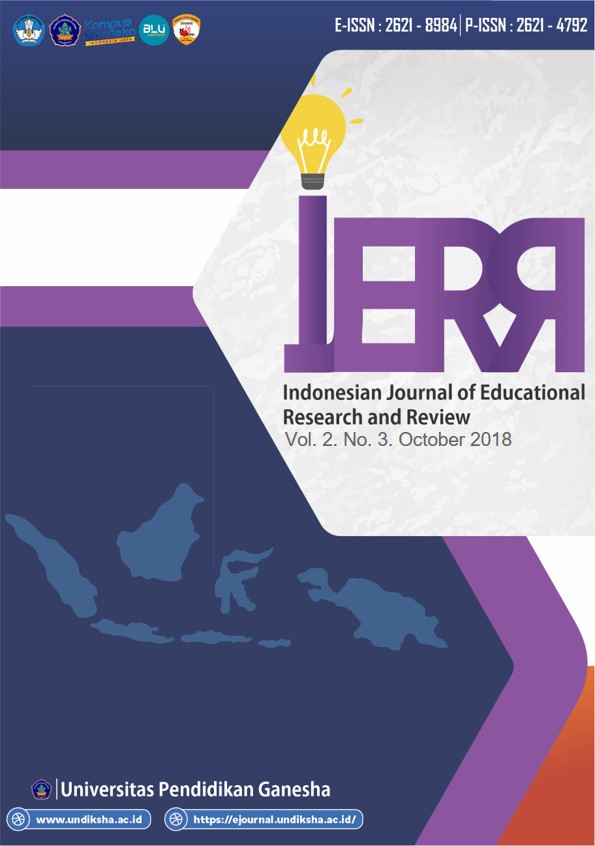MENINGKATKAN PRESTASI BELAJAR BAHASA INDONESIA MELALUI BIMBINGAN KONSELING
DOI:
https://doi.org/10.23887/ijerr.v2i3.21815Abstract
Penelitian ini bertujuan untuk meningkatkan prestasi belajar Bahasa Indonesia siswa di SMP Negeri 2 Kerambitan. Kajiannya dilatarbelakangi oleh tinggi rendahnya prestasi belajar Bahasa Indonesia di sekolah. Datanya diperoleh menunjukkan prestasi belajar Bahasa Indonesia siswa adalah 45% dari 24 siswa yang memperoleh nilai sesuai dengan KKM. Sehingga perlu adanya Bimbingan Konseling dalam meningkatkan Prestasi belajar Bahasa Indonesia tersebut. Setalah dilakukan Bimbingan Konseling pada siswa kelas VIII A Semester I Tahun Pelajaran 2017/2018 di SMP Negeri 2 Kerambitan terjadi peningkatan yang signifikan, yakni pada siklus I meningkat menjadi 63% dengan rata-rata 74 sedangkan pada siklus II menjadi 90% dengan rata-rata 81. Hal ini menunjukkan bahwa Bimbingan Konseling dapat meningkatkan Prestasi Belajar Bahasa Indonesia Siswa Kelas VIII A Semester I Tahun Pelajaran 2017/2018 SMP Negeri 2 Kerambiatan.References
A Hallen, Bimbingan dan Konseling, Jakarta : Ciputat Pers : 2002.
Sofyan S. Willis, Konseling Individual Teori dan Praktek, Bandung : Alfabeta, 2007.
Arikunto, Suharsimi; Suhardjono; Supardi. 2006. Penelitian Tindakan Kelas. Jakarta: PT Bumi Aksara.
Downloads
Published
How to Cite
Issue
Section
License
Authors who publish with the Indonesian Journal of Educational Research and Review (IJERR) agree to the following terms:
- Authors retain copyright and grant the journal the right of first publication with the work simultaneously licensed under a Creative Commons Attribution License (CC BY-SA 4.0) that allows others to share the work with an acknowledgment of the work's authorship and initial publication in this journal.
- Authors are able to enter into separate, additional contractual arrangements for the non-exclusive distribution of the journal's published version of the work (e.g., post it to an institutional repository or publish it in a book), with an acknowledgment of its initial publication in this journal.
- Authors are permitted and encouraged to post their work online (e.g., in institutional repositories or on their website) prior to and during the submission process, as it can lead to productive exchanges, as well as earlier and greater citation of published work. (See The Effect of Open Access)












